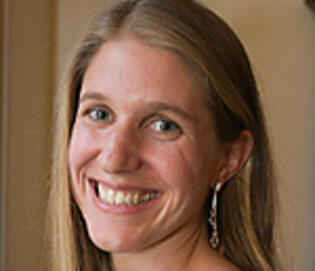
Creative Writing Award Winner 2006
Class of 2006
Laura Fitzgerald, ‘06 a native of Connecticut, graduated from Bowdoin College with a BA in Anthropology. After college, she became a Community Health Educator for Americorps and the United States Peace Corp. Her travels have taken her to Ireland, southeast Africa, and Mexico. She will leave Yale in a few months to begin her career as a Nurse Midwife.
Transcript of the Reading:
Passage
Two winters ago, you tried to explain nephrology to me over coffees at Starbucks. You co-opted a neighboring table in order to make space for intricate diagrams. I nodded encouragingly, intellectually absent, convinced that I would never wrap my brain around this information. Shamefully aware that I just didn’t care about the particulars of renal function, I worried that perhaps I’d selected the wrong profession. I didn’t want to tell you, an almost-doctor, that none of my nursing coursework was sticking. “Bulimic learning”, an insensitive yet apt term for the frantic cerebral stuffing of copious medical tidbits followed by repeated exam-time purging, was proving completely ineffective.
Without a Herculean effort to stay on task, academic lessons easily drifted towards casual conversation. We talked a lot about Africa in those days. It had been difficult for me to trade the visceral intensity of life in an HIV ravaged village, where the whiteness of my skin conferred instant authority, for graduate school’s brain-centered routine. That first semester, taking blood pressures, in the presence of anyone but my singular assigned patient, paralyzed me. Simultaneously burdened with self-consciousness and irritated by invisibility, I donned blue scrubs and forced myself to play nurse. How unfair, to find myself reduced to tears by an undecipherable urine dip, regularly knocked to my knees by the most prosaic clinical chore. Already, my memories of Africa had taken on a nostalgic vividness, painted over in see-through colors of exaggerated worth and authenticity. Sloshing through a grey New England winter, I wore out the mental videos of my old life.
You asked me why, after three years of frenetic travel, I’d decided on nursing. So I painted a scene for you, aware that your senses possessed a unique ability to reconstruct what had once been my African reality. I verbally shaped a darkened hut, described its stink of rotting mango and urine. I repositioned the skeletal female body on a reed mat inside of it, and drew the near indistinguishable features on the planes of her face. I added untouched bowls of cornmeal porridge forgotten by her stick-thin thighs, recounted hopeful spoons standing upright in the cemented mush. I placed myself next to her dusty, cloth-covered head and reached for her hand. To you, I repeated the words that the woman’s brother had spoken to me at the time. “It’s her bowels. She can’t keep anything in. She’s stopped eating.”
I probably didn’t tell you that in the actual lived moment I experienced an intense desire to flee. I was too embarrassed to admit that I had no idea how to deal with this woman, clearly infected with the virus that legitimized my presence in her country. I could have conducted a class right then and there about the modes of transmission and risky versus safe behaviors, but I was painfully unable to act as a loving support for a dying woman. Nursing school was supposed to grant me this skill with a mere tap on the head by a fairy godmother’s wand. So impatient for the nearly imperceptible transition from non-nurse to nurse and hoping to spare myself the agony of ignorance, I willed the change to happen instantaneously.
When the nagging feeling of inadequacy persisted, I entertained the possibility that the affliction was permanent. You insisted that it was not. And so, this past summer, when I returned to Africa to work as a student nurse-midwife, you were one hundred percent supportive. The work was invigorating, exactly as I’d wished. I palpated bellies, checked fetal heart tones, gave injections, and started IV’s. You called once, crossing an ocean from another planet. I was in the middle of a labor exam. Leaning over the restless contents of an enormous brown belly, stretching a measuring tape from pubis to sternum, I heard the phone’s telltale ring sounding from the pack at my waist. Looking towards the woman, I raised my pointer finger in a “just a minute, I’ll be right back” gesture, before stepping out of her cubicle.
Removed from the maternity ward, watching anxious caretakers milling around the entrance, I told you of my deliveries. I described a newborn that emerged with a hand cupping her cheek in a startling expression of bemused wisdom. I talked of suturing and intubations. For those brief few minutes, I let go of my patient, writhing with contractions, awaiting my calm, comforting touch. But I sensed a brand new itchiness as I spoke with you, an anxiety that hurried my speech. My patient, my Zulu asisi, enclosed in an inner world of concentration and pain, exerted a magnetic pull with which you could not compete. Upon returning to her side, my internal gauges imperceptibly recalibrated. Time was now measured in fetal heartbeats, and the subtle in and out of my breath took its cue from the body before me.
